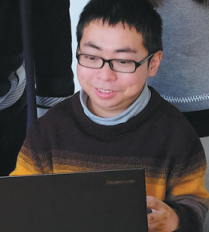
Yi Xiaoyuan, a graduate student at Tsinghua University, works in a computer lab. [Photo/Xinhua]
Yi Xiaoyuan, a wheelchair user, has never let his physical condition hold him back.
The graduate student at Tsinghua University in Beijing is now working to ensure that more disabled people will have the opportunity to try their best and create their own futures.
The 28-year-old was born in Yuxi, 90 kilometers south of Kunming, capital of the southwestern province of Yunnan.
At the age of 6, he developed rheumatoid arthritis, which affected his growth, and also had a bone disorder that became progressively more debilitating. By age 11, his legs were so frail that walking was excruciatingly painful. As a result, he began using a wheelchair.
However, Yi's mother, who became his caregiver, and his father, a policeman in Yuxi, stopped at nothing to help him overcome the challenges he faced.
His mother, Guo Qiongfen, made sure he got to school every day, and helped him from breakfast time to bedtime.
Yi excelled academically. In 2012, when he took the gaokao, the national college entrance exam, he was the 16th-highest-ranked student out of 210,000 high school graduates in Yunnan. It had always been his dream to attend Tsinghua, one of China's top schools, and now he had the score to do so.
Because Guo accompanied him to the university to provide care, the school offered them adjacent dormitories, which allowed Guo to help Yi wash, dress, move from his dormitory to classes, and do other things most people take for granted.
When talking about his disability, Yi said his misfortune has made him stronger.
"Disabled people in China don't need money or sympathy. What they need is opportunity," he said.
He chose automotive engineering as his undergraduate major and is now studying computer science for his master's. He has thrived at Tsinghua, getting A grades, joining the debating team and a literature study group, and making many friends.
In April 2017, Jiu Ge, a poetry-generating machine that Yi and his team spent two years working on, competed in its first classical poetry relay against two poets. The contest saw each side take turns and use the last word from the previous verse to start their own line.
Using advanced linguistic artificial intelligence, Jiu Ge, named for a famous series of classical works, analyzes and draws inspiration from a database of more than 300,000 Chinese poems and is able to imitate their style, symbolism and rhythms.
Although the machine lost the competition, Yi said he was "very satisfied" with its performance.
"I want 'my baby' to maximize her potential through deep learning, to be free from her physical limitations and become a sentient being capable of enjoying beautiful poetry, just like me," he said.
"Life has not always been kind to me, but I am still fortunate, because I can still read and write computer code. Lots of people are more disabled than me. I hope I can use what I have learned about automatic speech recognition, automatic character recognition and input methods to develop more tools to improve accessibility for them."
|






7740f3b5-9ecb-438e-9052-76cb2d4bb671.jpg)

